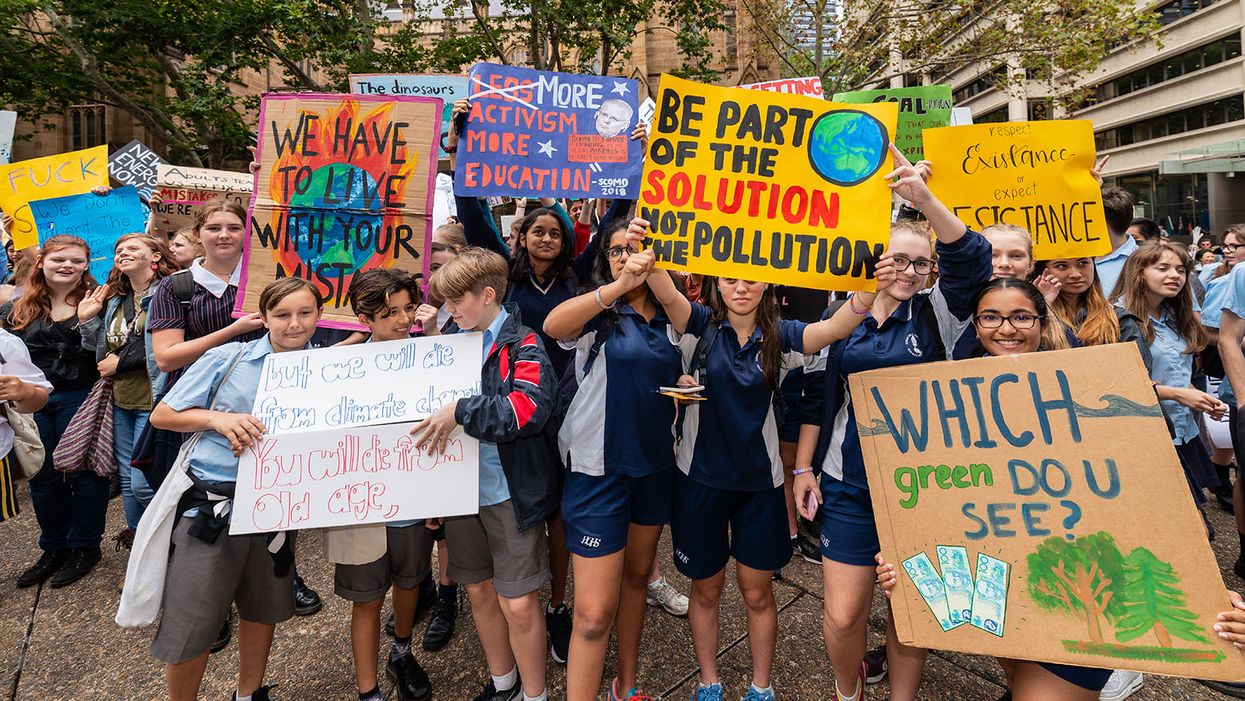Middle school student activists write their elected representatives to urge climate action.
In 2019, Earth | Food | Life writing fellow Lucy Goodchild van Hilten, a science writer and mother of a young child, wrote a piece titled, “How to Talk to Kids About Climate Change.” Now I am pleased to report on the other side of that coin: How kids talk to adults about climate change.
This article was produced by Earth | Food | Life, a project of the Independent Media Institute.
It all started a few weeks ago when my friend Christine Willis invited me to speak to her seventh grade class at the Math and Science Exploratory School in Brooklyn, New York. Christine and her co-teacher Allison Pariani wanted their students—who are all quite aware of the various impacts of climate change—to grasp the power and potential of persuasive writing and thought that my work as an advocacy journalist would help. At the recommendation of another friend, Megan Dyer, herself a New York-based climate activist with Mothers Out Front and mother of a 12-year-old and a 15-year-old, I had the class sit in a circle to create a space where we could exchange ideas as peers. As Dyer told me, “Kids are so used to being talked to; so they love when they are heard.” Instead of presenting to them, I simply asked them questions to get to the activity I had in mind: Write letters to five of their elected legislators: Senator Chuck Schumer, Senator Kirsten Gillibrand, Representative Hakeem Jeffries, State Senator Jabari Brisport and State Assemblymember Jo Anne Simon.
In the circle, I asked them what journalism was, and what advocacy meant. Through this, they were able to figure out for themselves what “advocacy journalism” was—journalism with a point of view; in my case, it’s about getting consumers, voters, community members, public officials and legislators to take action to stem the climate crisis. I told them that part of what I do as an advocacy journalist covering the environment is to provide readers not only with facts about the climate crisis but also to show them ways to get involved in solutions. One direct way to get involved is to tell our elected representatives how we would like them to vote on bills and budgets that can have a meaningful impact on the climate fight. I showed them how to look up their elected representatives via OpenStates.org.
One of the questions I asked them is what concerns them about climate change. Their answers varied, but they were all legitimate fears. They are worried about rising sea levels, extreme weather events, the spread of disease, air pollution and the extinction crisis—all issues directly impacted by the climate crisis. I showed them a video about how St. Patrick’s Cathedral in Manhattan has switched from using oil and gas heating to a renewable heat source: geothermal energy.
I provided the students with letter templates urging lawmakers to support a part of the New York state budget that puts buildings on a renewable energy path, and bills on the state and federal levels aimed to strengthen our response to the climate crisis. The students reviewed the letters and added their own words to personalize them. Their parents approved these letters, which were emailed and tweeted to the legislators.
Ms. Willis’ Seventh Grade Class
The Math and Science Exploratory School (MS447)
345 Dean Street
Brooklyn, NY 11217
April 4, 2022
Assemblymember Jo Anne Simon
New York State Assembly
341 Smith Street
Brooklyn, NY 11231
Dear Assemblymember Simon:
Our names are Teyo, Rose, Elsie, Adriana, Amelie, and Luolin. We are students in Ms. Willis’ seventh grade class at the Math and Science Exploratory School in Brooklyn, New York. We are also your constituents. Climate action is one of our top priorities because we care a lot about the rising sea levels that are swallowing up the world. We are especially worried because we live in a coastal city.
We have no idea if this letter will make a difference. It probably won’t. We don’t really see a reason why it would. We have faith in people. We believe they are naturally good. But after everything the climate is facing and the lack of action from adults, we have very little faith in lawmakers and elected leaders who are supposed to be protecting the future for kids like us.
We are especially concerned about emissions from buildings which account for more than one-third of all greenhouse gas emissions in New York State. We need renewable heat for our buildings now, and geothermal energy can help.
We are writing you today to urge you to support:
- Part EEE of the Senate’s TED (transportation, economic development and environmental conservation) budget proposal, which updates building codes and appliance efficiency standards, saving New Yorkers billions of dollars, and prohibiting fossil fuels in new construction starting in 2024.
- Gas Transition and Affordable Energy Act sponsored by Senator Krueger (S8198) and Assemblymember Fahy (A9329), which reforms our public service law and requires the state to make a transition plan for buildings.
We need fossil fuels out of new building construction by 2024 and we must stop subsidizing gas utility expansion. We must stop fossil fuel expansion in New York and implement our climate law in our state budget.
Thank you.
Sincerely,
Teyo Chait, Rose Herper, Elsie Armstrong, Adriana Esposito, Amelie Miller, and Luolin Wu
Author Bio: Reynard Loki is a writing fellow at the Independent Media Institute, where he serves as the editor and chief correspondent for Earth | Food | Life. He previously served as the environment, food and animal rights editor at AlterNet and as a reporter for Justmeans/3BL Media covering sustainability and corporate social responsibility. He was named one of FilterBuy’s Top 50 Health & Environmental Journalists to Follow in 2016. His work has been published by Yes! Magazine, Salon, Truthout, BillMoyers.com, CounterPunch, EcoWatch and Truthdig, among others.


